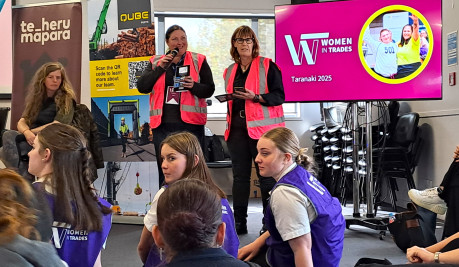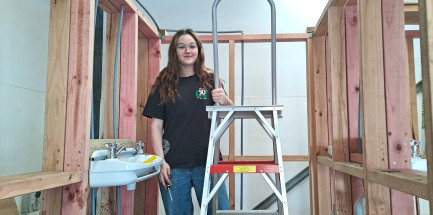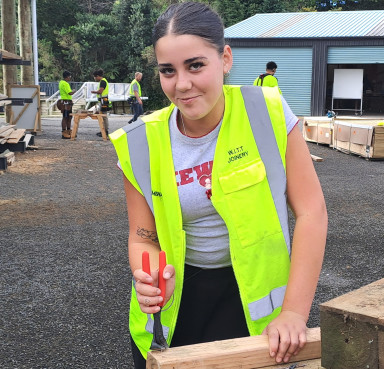Women in trades, boots and all
Misha Hoskin started playing with building tools when she was five. She’s 17 now and is building a house with her carpentry classmates at WITT – a house that will be sold at market rates at the end of the year. She designs and builds her own bedroom furniture in her spare time and aspires to getting an apprenticeship as a builder or joiner.
No surprise that Misha was keen to attend the Women in Trades event last week along with 400 others - mostly high school age – at the TET stadium in Inglewood to learn about career opportunities in the trades sector. She went last year, loved it and encouraged her mates to come along this year.
As well as try their hands using power tools, drive a tractor, operate an excavator, ride an elevated work platform or master a virtual welder, attendees heard inspiring insights and life experiences from a panel of women speakers from across trades, with Fulton Hogan project manager Kimberley de Vries as MC.
More women needed in trades
Event organiser Katrina Mayo, Work Based Learning Lead at WITT Trades School, says the day was a huge success with the highest turnout in its third year, including 35 exhibitors from across trades, construction and primary industries.
The event is an empowering forum for young women curious about trades to find out more about training and work, and to connect with women who’ve had experience and success. This year’s panellists were Donna Bates (Pepper Construction); Ashley L’Heureux (First Gas); Miranda Wells (800 Trust); Maggie DeBeer (Qube Ports); Rochelle Grant (Fonterra); and Kimberly.
Katrina is passionate about her mahi and mission to encourage more women into trades. With a background in trades training and career development, Katrina can see the opportunities in the construction sector that are available for young women. She is also keen to promote further career development opportunities for the sector with initiatives like Taranaki Construction Connect, a hub for professional development that consolidates the learning opportunities in Taranaki across the 30+ industry associations.
She encounters many talented women in trades – at all stages of career development – and says the time is ripe with a demand for talent in the sector.
Echoing her views, Leif Haseltine, project manager for Whitaker Civil Engineering, represented his company at Women in Trades. He facilitated an excavator for attendees to have a go at operating with a challenge to scoop up floating balls and transfer them between water tubs. It looked like a delicate and difficult task.
Leif says from his observations over 25 years in the sector are that women are highly competent and sought after as heavy machine operators because they look after the equipment better, operate it more gently and are more mindful of taking care of what’s going on at a building site to avoid collisions or damage to other structures. All this can save a business mega-bucks in the cost of repairing, replacing and maintaining machinery.
Kerrie Thomson-Booth, Deputy Director of WITT’s trades school, says Women in Trades was “fantastic" with the benefit of this event being “just for the girls with no pressure of boys looking on, or being self-conscious in trying something that hasn’t traditionally been seen as a ‘girls’ job’.”
Kerrie is a proud testament to bucking the norm, having trained as a mechanic over 40 years ago. “I know the opportunities being in the trades can give our wahine. I love this event as it opens their eyes to possibilities they may never have considered. It’s about hand-on, fun activities they can try in a safe and nurturing environment.”

Caption: Katrina Mayo and Kerrie Thomson-Booth hosting Women in Trades.
Hands-on mahi
Jesse Maindonald is enrolled in WITT’s Plumbing, Gasfitting and Drainlaying (Level 3) course. She moved to Taranaki last year from Wollongong, Australia, where she’d worked in a plumbing shop and did construction, metalwork and electrotechnology through school and vocational education at TAFE (Technical and Further Education).
Jesse enjoys the practical aspects of plumbing, such as working on new builds where plumbers get involved in design and product recommendations – a creative element that harks back to her experiences working in a retail plumbing store.
She doesn’t mind the icky parts of the job, like dealing with blocked toilets. “It’s like surgeons and doctors dealing with blood and organs. You get used to it.”
Jesse enjoys getting outside and the variety and physical nature of the work, including drainlaying and installing stormwater pipes on infrastructure projects. The course also covers water systems – understanding town water supply water treatment plants, sewage, and storm water and the various methods of filtration, and measuring and maintaining sanitation.

Caption: Jesse Maindonald on a plumbing task at the WITT workshop
She’d like to have her own plumbing business with a plumbing shop attached as she enjoys bathroom design. In her spare time, she likes playing an architectural simulation game called Bloxberg where players design and furnish their own homes, including plumbing systems.
Bailey Allen, Misha’s classmate, discovered a talent for woodwork and metalwork at high school in Stratford. She’s keen to do building or joinery, or a bit of both.
“I like that it’s hands on and I’m not just sitting down doing nothing because I get a bit restless.”
Do they encounter any weird reactions about learning a trade?
Misha’s whanau are DIY and home reno fans. Being a builder is in sync with her background. So, when a guy Misha told she was training to be a builder said: ‘I wouldn’t let a girl build my house’ – she just laughed it off. She says the guys on her course are supportive and inclusive of them being there. “It’s been pretty good – we have a solid class.”
Misha enjoys the challenge of learning new skills, including problem solving “which is a big part of building.”

Caption: Misha Hoskin preparing timber beams for the house build project.
Quality control on every aspect of the build is key, as well as learning about sustainability and waste management on site. Her class will be carrying out an audit of their waste materials bin. “Once the bin’s full we tip it all onto a tarp and go through all of it and see what we could recycle or re-use. It’s one of the standards we get assessed on – it’s a new part of the way we do things, as traditionally it’s a high waste industry.”
She’s excited to see the finished house this November.
“It’s an amazing course - we get this full experience of building a house through the year and learning everything as we go. It’s impressive – to build a house when you’re 17!”
Caption (top): Stratford High School student Madisyn Pascoe operating an excavator at the Women in Trades event.